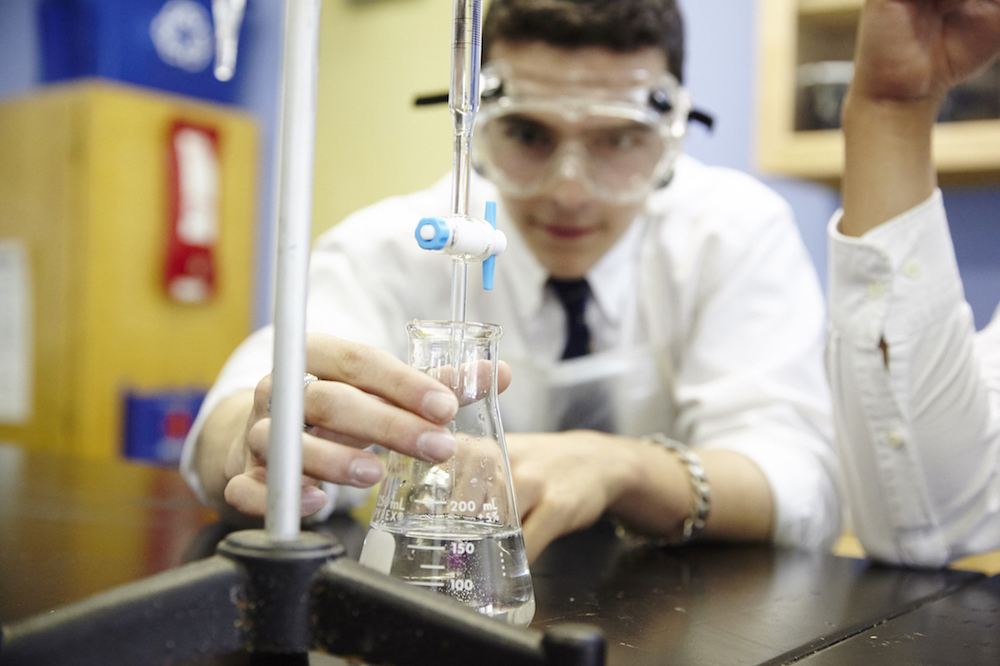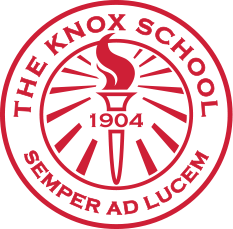
The Knox School Science Department strives to spark curiosity in its students about the wonders of the scientific world around them. Our curriculum is driven by the processes of inquiry, problem-solving and discovery, and learning is intentionally relevant. Knox students become scientifically literate and learn to be effective problem solvers. Through hands-on, engaging activities that extend beyond the walls of the classroom, they come to realize that science is more than facts – it is using a computer to program a robot to complete a series of tasks, exploring our campus waterfront as a living, learning lab during Biology class, using CAD software and 3D printers to engineer and design a multitude of projects, or even competing in a Science Bowl at Brookhaven National Laboratory, or a LEGO FIRST Robotics Competition.
Biology (9, 10)
Biology is the larger umbrella under which the study of living things occurs. This course serves as a gateway to understanding scientific interactions throughout the living environment, and gives students the tools to make predictions about the natural world. By utilizing the scientific method, students investigate the natural world, both conceptually and through hands-on and in the-field lab work. Throughout the course, students gain exposure to the many branches of biology, and work towards understanding the role and impact of humans on the natural world. The primary skill of scientific investigation is one of the most important and basic skills; this course serves to cultivate that, and teach students to purposefully engage with the world. Prerequisite: Physical Science or similar 9th grade science course; fulfills lab course requirement.
Chemistry (9, 10, 11)
Chemistry touches our lives almost everywhere and every day – in medicine, the clothes we wear, the games we play, as well as the industries that produce consumables used by people on a regular basis. In Chemistry, students design and conduct experiments using a variety of laboratory techniques and technology, apply stoichiometric concepts to chemical reactions, analyze atomic structure and how they relate to bonding and periodicity, apply chemical concepts to reactions and apply gas laws to explain natural phenomena. Note: Chemistry is strongly recommended for college-bound students and is a must for future study in any science or health-related field.
Physics (10, 11, 12)
Physics is the study of why the universe is the way it is. It is not just a series of facts and formula that you memorize. This hands-on, inquiry-led course allows students to take a formal look at many of the physical aspects of our universe: from basic fundamentals all the way up through counter-intuitive but experimentally-confirmed principles. It includes the study of Modern Physics, such as discoveries, theories, and current research. Students explore Newtonian Mechanics and the various aspects of matter in motion and energy, then delve into Waves and Light. The course concludes with a study of Electricity and Magnetism. Prerequisite: successful completion of Algebra I.
Honors Designation (9-12)
Our Academic Program is College Preparatory; as such, all classes are taught at an accelerated pace. Honors credit may be earned on an individual basis by students willing to pursue a more challenging syllabus and assessment process. These students will need to go through an approval process with the Dean of Academics.
Fundamentals of Equine Science (9, 10, 11, 12)
This course allows students to explore equine history, breeds, identification, conformation, and judging. As the year progresses, students learn concepts in anatomy, physiology, nutrition, health, equine facilities and management and career opportunities. This course promotes the development of cross- curricular skills in Math, English and History. Students learn to communicate effectively through writing and language as well as develop and use critical thinking skills. Open to Upper School students who are equine enthusiasts, equestrians, or simply curious about horses.
Equine Science II (10, 11, 12)
In Equine Science II, students will take a more in-depth look at the following equine topics: fundamentals of riding, teaching riding methods, judging trends, therapeutic riding, purposes of different riding equipment and tack, equine health and management with specific focus on equine anatomy, diseases, first aid, emergency procedures, pharmaceuticals, senior horse health management, diagnosing lameness and nutrition as related to performance and health. Our third term will focus on working in the equestrian world and exploring the topics of veterinarian, vet technician, farrier, research, event managers, stable managers, massage, chiropractic and acupuncture therapists, equestrian marketing, professional trainer and judging competitions. Students will develop cross curricular skills dealing with math, English, and social studies which coincide with the topics focused on during class. Skills will include writing and language as well as continue to develop and use critical thinking skills. Prerequisite: Fundamentals of Equine Science.
Marine Science (9, 10, 11, 12)
In Marine Science, students will learn about the physical, chemical and geological aspects of oceanography. The course includes Marine Biology topics, in which students explore ocean life and their interactions with each other. It also discusses the impact humans have on the oceans and other bodies of water.
AP Biology (11, 12)
AP Biology is an upper school elective offered for students who meet The Knox School AP criteria, and who have demonstrated a strong interest and dedication to life sciences. Students in AP Biology work towards successful completion of the College Board curriculum and sit for the AP Biology Exam. The class uses the framework laid out by the College Board in tandem with investigative labs. The goal of the course it to prepare students for a university level Biology class, and if eligible, test results may be used as an exemption from introductory Biology in college. Prerequisite: Successful completion of Biology.
AP Chemistry (11, 12)
This course will demonstrate how chemistry is related to our daily lives, help students develop problem solving skills, and also cultivate a student’s ability to think clearly and express his/her ideas. It is designed to be the equivalent of a general chemistry course which is normally taken during the first year of college. Advanced Placement Chemistry has an emphasis on inquiry and critical thinking skills. Laboratory work is a vital portion of the course and uses a variety of different technology and lab ware. The technology will include graphing calculators, LabPro devices, graphing and data analysis software and various chemistry apparatus. This course requires a working knowledge of chemistry and algebra II. The pace will be quicker than a typical high school chemistry course, uses a college level text and lab work, and also requires more time than the typical high school course. Prerequisite: Successful completion of Chemistry
AP Environmental Science (11, 12)
The goal of the AP Environmental Science course is to provide students with the scientific principles, concepts, and methodologies required to understand the interrelationships of the natural world, to identify and analyze environmental problems both natural and human-made, to evaluate the relative risks associated with these problems, and to examine alternative solutions for resolving or preventing them. Prerequisite: Two years of high school laboratory science, specifically, one year of life science and one year of physical science.
AP Physics I: Mechanics (11, 12)
AP Physics I follows the most recent description as noted by the AP College Board and is equivalent to a first-year college Physics class for Science and Engineering students. It is intended to prepare students for the AP Physics C Exam and explores topics such as Mechanics, Electromagnetism, Waves and Fields, Optics, and Modern Physics, including discoveries, theories, and current research. The development of critical thinking skills is an integral part of Physics, therefore, most labs are open-ended and inquiry-based. In addition, students will be required to present solutions to problems during peer instruction activities. Open to Upper School students who have successfully completed Physics and Pre-Calculus.
AP Physics II: Electricity and Magnetism (11, 12)
The Physics II Electricity and Magnetism course is a calculus-based, college level physics course, especially appropriate for students planning to specialize or major in physical science or engineering. The course explores topics such as electrostatics; conductors, capacitors, and dielectrics; electric circuits; magnetic fields; and electromagnetism. Introductory differential and integral calculus is used throughout the course. Prerequisite: Successful completion of AP Physics I.
Anatomy & Physiology (11, 12)
Anatomy and Physiology is designed for students who are interested in pursuing a career in fields related to the human biological system. This course covers the basics of human anatomy and physiology, including anatomical terminology, basic biochemical function, cells and tissues, and the skeletal, muscular, nervous, endocrine, cardiovascular, lymphatic, respiratory, digestive, excretory and reproductive systems. The course includes lab work, but does not fulfill a lab requirement. Students work individually and in groups to prepare themselves for college-level sciences. Preferential enrollment will be given to Seniors. Prerequisite: Biology; Juniors and Seniors only.
PHY101 College Physics (11, 12)
First course of a full year algebra/trig-based college physics sequence for liberal arts, life science, and physical therapy majors designed to acquaint students with basic concepts of physics. Topics covered include linear and rotational kinematics, dynamics, conservation of energy and momentum. Available for college credit through the Suffolk Community College Beacon Program.
PHY102 College Physics II (11, 12)
The PHY102 course is a calculus-based, college level physics course, especially appropriate for students planning to specialize or major in physical science or engineering. The course explores topics such as electrostatics; conductors, capacitors, and dielectrics; electric circuits; magnetic fields; and electromagnetism. Introductory differential and integral calculus is used throughout the course. Available for college credit through the Suffolk Community College Beacon Program. Prerequisite: Successful completion of PHY101.
Introduction to Robotics
This course introduces students to the world of robotics and programming. Beginning with the history of robotics, students come to an understanding of how robots function as an integral part of today’s society. Working in our STEM lab, students take a hands-on approach to the fundamentals of machine logic and automated problem solving with an emphasis on the basics of movement and physical interaction with the local environment. Open to Upper School Students.
3D Printing
The 3D Printing course will provide students with the opportunity to use technology that is growing in the world around them. Students will gain an understanding of how these technologies can benefit us in our day-to-day lives. Students will explore a variety of 3D design software programs from free and web-based to industry standard and advanced software. The course will introduce students to elements of digital design and drafting, geometry, and how to use and work with 3D printers. Requirements: Windows laptop with dedicated graphics preferred
3D Design and Drafting
3D Design and Drafting will provide students with the opportunity to expand their skills in 3D Design, as well as learn and use applied Geometry. Students will spend time learning geometry, geometric constructions, and 2D sketching, which will lead into 3D design. For the entirety of the course, students will be using Fusion 360 Software both in and out of class. By the completion of this course, students will have the skills to work in both large-scale and small-scale engineering through use of power tools, hardware and 3D printers. Prerequisites: Successful completion of Geometry and 3D Printing. Requirements: Windows laptop with dedicated graphics
Introduction to Robotics
This course introduces students to the world of robotics and programming. Beginning with the history of robotics, students come to an understanding of how robots function as an integral part of today’s society. Working in our STEM lab, students take a hands-on approach to the fundamentals of machine logic and automated problem solving with an emphasis on the basics of movement and physical interaction with the local environment. Requirements: Laptop (any OS)
Advanced Robotics
Advanced Robotics further explores robotic assembly, architecture and capability, and careers available in the field. Through understanding the diversity and power of each area of robotics, students work collaboratively in a competitive proposal-solution environment. Learning will be fast-paced and hands-on, with real world problem solving at the center of the coursework. Prerequisites: Successful completion of Introduction to Robotics. Requirements: Windows or Mac laptop, no Chromebooks or tablets
Introduction to Coding
This class will introduce students to the world of Computer Science, which includes an introduction to the history of computers and how computers work. Over the course of the year, students will learn the Python programming language, which they will use to write their own programs and algorithms that they can take with them from class. By the end of the year, students will have had experience coding basic functions, data structures, visual effects, and graphical interfaces. Requirements: Windows or Mac laptop, no Chromebooks or tablets
Introduction to Computer Science and Engineering
Introduction to Computer Science and Engineering is a multifaceted course that is designed for students who are new to computer science and want to learn from scratch, as well as for students who are well versed in computers who want to expand their skills. This course will take students through the history of computers, the engineering and parts of computers and how they function, and basics of software and workflow. By the end of this course, students will have built their own computers that they will have used throughout the course, and then bring home to keep. Requirements: $600 Materials Fee
Advanced Computer Science and Engineering
Advanced Computer Science and Engineering is a continuation of Introduction to Computer Science. Students who wish to continue with advanced will, instead of taking their computers home, learn more about the advanced back-end functions and programming of their self-made computers in addition to how the internet works, how to network, and finish upgrading their computers before taking them home at the end of the year. Prerequisites: Successful completion of Introduction to Computer Science and Engineering. Requirements: Fee for Windows 10 License.
STEM Capstone
In this course, students will discover and research a problem, propose, develop and execute a solution, then design, construct and present their solutions. Students will learn about current topics in STEAM, participate in round-table discussions, work together to devise solutions to given problems, and understand the importance of design efficiency. This course will prepare students for the rigors of college thesis and research courses which will require students to work on their own or in groups with minimal teacher interaction.
AP Computer Science Principles
AP Computer Science Principles introduces students to the breadth of the field of computer science. In this course, students will learn to design and evaluate solutions and to apply computer science to problem solving through the development of algorithms and programs. They will incorporate abstraction into programs and use data to discover new knowledge. Students will also explain how computing innovations and computing systems, including the internet, work, explore their potential impacts, and contribute to a computing culture that is collaborative and ethical. Prerequisites: Successful completion of at least two of the following- Introduction to Coding, Advanced Robotics, Computer Science and Engineering.
AP Computer Science A
AP Computer Science A introduces students to computer science through programming. Fundamental topics in this course include the design of solutions to problems, the use of data structures to organize large sets of data, the development and implementation of algorithms to process data and discover new information, the analysis of potential solutions, and the ethical and social implications of computing systems. The course emphasizes object-oriented programming and design using the Java programming language. Prerequisites: Successful completion of Computer Science and Engineering, AP Computer Science Principles, and either Introduction to Coding or Advanced Robotics.
Health
Upper School Health is designed to allow teens to discuss issues that affect them in a safe environment with trained educators and professionals. Units covered include physical fitness, psychological health, the dangers of drug and alcohol use, sexuality, and infectious diseases. Students examine contemporary public health problems through the news and media and will be encouraged to make positive lifestyle changes. This course is two terms and is required for graduation in New York State.
Physical Education
The Knox School Physical Education class is designed to ensure our student athletes have the opportunity to maintain mental and physical health. Each student athlete will be required to take a yearly fitness test as a starting point to measure their ability and, more importantly, to set goals as to where they want to be in the future in regard to their athletic ability. The Knox School Physical Education Class will also be designed to introduce and prepare student athletes to learn and compete in the sports offered at The Knox School regardless of the knowledge that they had beforehand.
Science Faculty
Matthew Frageau
B.A., Secondary Education – Hartford University
Matthew Frageau
Frank Chisena
M.S., School of Engineering & Applied Physics – Columbia University
B.S., School of Engineering & Applied Physics – Columbia University
Frank Chisena
Angelo Mauro
M.S., Mathematics – St. Joseph’s College
Angelo Mauro
STEM Teacher


